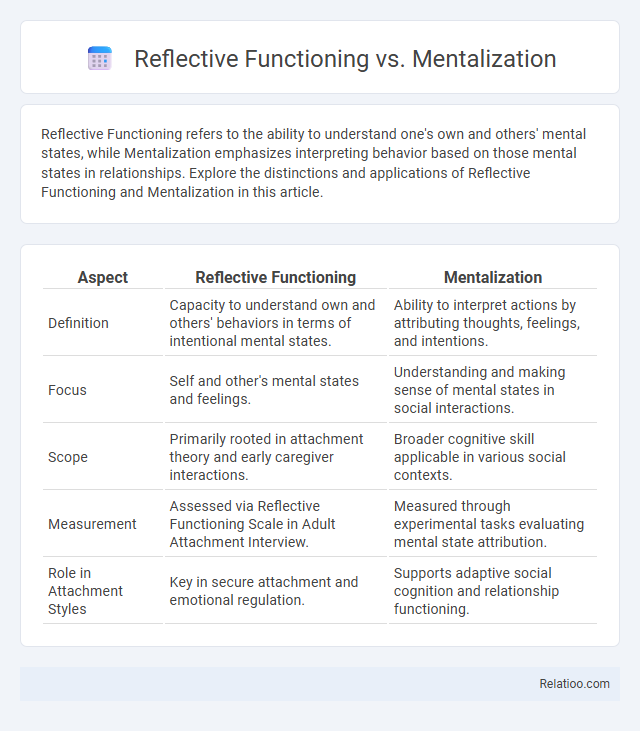Reflective Functioning refers to the ability to understand one's own and others' mental states, while Mentalization emphasizes interpreting behavior based on those mental states in relationships. Explore the distinctions and applications of Reflective Functioning and Mentalization in this article.
Table of Comparison
| Aspect | Reflective Functioning | Mentalization |
|---|---|---|
| Definition | Capacity to understand own and others' behaviors in terms of intentional mental states. | Ability to interpret actions by attributing thoughts, feelings, and intentions. |
| Focus | Self and other's mental states and feelings. | Understanding and making sense of mental states in social interactions. |
| Scope | Primarily rooted in attachment theory and early caregiver interactions. | Broader cognitive skill applicable in various social contexts. |
| Measurement | Assessed via Reflective Functioning Scale in Adult Attachment Interview. | Measured through experimental tasks evaluating mental state attribution. |
| Role in Attachment Styles | Key in secure attachment and emotional regulation. | Supports adaptive social cognition and relationship functioning. |
Introduction to Reflective Functioning and Mentalization
Reflective Functioning refers to the capacity to understand one's own and others' behaviors based on underlying mental states such as beliefs, desires, and feelings, serving as a core aspect of emotional regulation and interpersonal relationships. Mentalization, closely related, encompasses the broader psychological process of interpreting the mental states that drive behavior in oneself and others, often studied within developmental and clinical psychology for its role in social cognition and attachment. Both concepts emphasize the significance of recognizing internal experiences to foster empathy, self-awareness, and secure attachments, with Reflective Functioning often operationalized as a measurable component of Mentalization.
Defining Reflective Functioning
Reflective Functioning refers to the capacity to understand and interpret one's own and others' mental states, such as thoughts, feelings, and intentions, which plays a crucial role in emotional regulation and interpersonal relationships. Mentalization is a broader psychological concept encompassing the processes underlying Reflective Functioning, emphasizing the dynamic ability to make sense of behavior in terms of mental states. Defining Reflective Functioning centers on its function as a measurable skill reflecting how individuals interpret and respond to mental states in social contexts.
Understanding Mentalization
Understanding mentalization involves recognizing the capacity to interpret one's own and others' mental states, such as beliefs, emotions, and intentions, which guides social interactions and emotional regulation. Reflective functioning specifically refers to the operational measure of an individual's ability to mentalize, assessed through clinical tools like the Reflective Functioning Scale. Distinguishing between mentalization as the overarching cognitive-emotional process and reflective functioning as its measurable manifestation enhances targeted therapeutic interventions in psychology and psychiatry.
Historical Development and Theoretical Origins
Reflective Functioning and Mentalization both originate from psychoanalytic theory, particularly from the work of Peter Fonagy in the 1990s, focusing on understanding one's own and others' mental states. Historical development links Reflective Functioning to attachment theory, emphasizing its role in emotional regulation and interpersonal relationships, while Mentalization extends this concept into broader therapeutic and developmental contexts. Your understanding of these constructs can deepen by recognizing Reflective Functioning as a measurable capacity derived from mentalization, grounded in theory integrating cognitive, developmental, and affective components.
Key Differences Between Reflective Functioning and Mentalization
Reflective Functioning and Mentalization both involve understanding the mental states of oneself and others but differ in scope and application. Reflective Functioning primarily refers to the capacity to interpret behaviors in terms of underlying mental states, often assessed through measures like the Reflective Functioning Scale (RFS). Your ability to enhance interpersonal relationships depends on recognizing that Mentalization encompasses a broader, dynamic process that includes emotional regulation and perspective-taking beyond mere reflection.
Overlapping Concepts and Shared Foundations
Reflective Functioning and Mentalization both refer to the capacity to understand the mental states of oneself and others, highlighting their overlapping concepts in social cognition and emotional regulation. These constructs share foundational elements such as theory of mind, empathy, and introspection, which are crucial for interpreting behaviors and fostering secure relationships. Your understanding of these processes enhances emotional awareness and improves interpersonal communication by integrating self-reflection with the perception of others' perspectives.
Role in Attachment and Emotional Regulation
Reflective Functioning involves understanding your own and others' mental states, crucial for secure attachment by enabling empathy and emotional attunement in relationships. Mentalization expands on this by interpreting behaviors based on underlying thoughts and feelings, supporting emotional regulation through better perspective-taking and reducing impulsivity. Both processes reinforce healthy attachment patterns by fostering emotional awareness and resilience in social interactions.
Assessment and Measurement Tools
Assessment and measurement tools for reflective functioning primarily include the Reflective Functioning Scale (RFS), which evaluates individuals' capacity to understand their own and others' mental states through narrative analysis, often applied to Adult Attachment Interviews. Mentalization, while overlapping with reflective functioning, is assessed using tools like the Mentalization Questionnaire (MZQ) and the Reflective Functioning Questionnaire (RFQ), which gauge the ability to attribute mental states in interpersonal contexts and emotional regulation. These instruments provide nuanced insights into cognitive and emotional processes, aiding in distinguishing reflective functioning as a specific component within the broader construct of mentalization.
Clinical Implications and Interventions
Reflective functioning, mentalization, and reflective functioning are interconnected constructs essential in clinical psychology, particularly for understanding attachment and emotional regulation. Enhanced reflective functioning facilitates clinicians' ability to help patients interpret their own and others' mental states, improving therapeutic outcomes in disorders like borderline personality disorder and trauma-related conditions. Targeted interventions such as Mentalization-Based Treatment (MBT) leverage these processes to foster self-awareness and interpersonal effectiveness, reducing symptom severity and promoting emotional resilience.
Future Directions in Research and Practice
Future directions in research and practice emphasize refining the distinctions and overlaps between reflective functioning and mentalization to enhance therapeutic outcomes. You can expect advances in neurobiological studies and longitudinal research to clarify mechanisms underlying these constructs and improve assessment tools. Integrating these insights will foster tailored interventions that promote emotional regulation and interpersonal understanding in clinical settings.

Infographic: Reflective Functioning vs Mentalization
 relatioo.com
relatioo.com